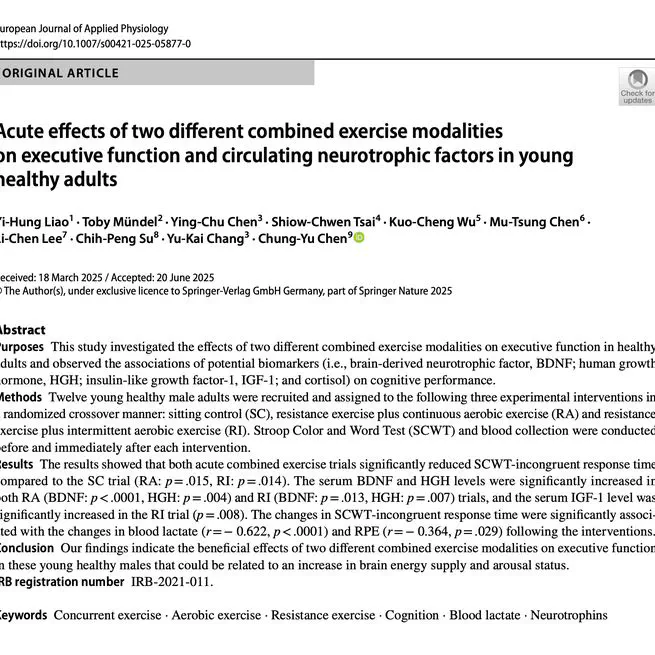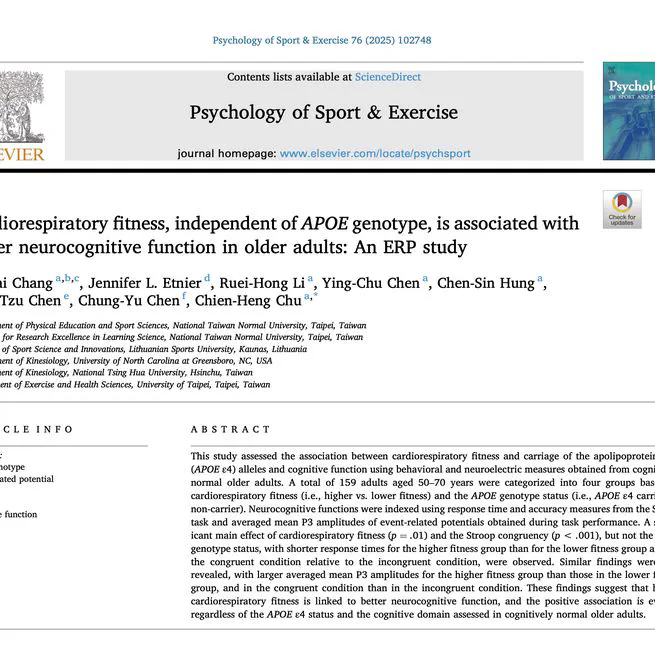
This study examined how two acute combined exercise modalities—resistance exercise plus continuous or intermittent aerobic exercise—affect executive function and neurotrophic factor levels in young men. Improvements in Stroop test performance and increases in BDNF, HGH, and IGF-1 were observed, especially after the intermittent aerobic condition.
Jun 20, 2025

This randomized controlled trial investigated the acute effects of resistance exercise (RE) intensity and repetition—under matched volume—on inhibitory control (IC). Seventy-eight young adults were assigned to moderate-intensity (60% 1RM, 3×10), low-intensity (30% 1RM, 3×20), or control (reading). Stroop Task performance revealed significantly better IC in both exercise groups (MI: p = .026; LI: p = .040) vs. control, with no difference between MI and LI. Blood lactate increased significantly post-exercise in both RE groups. Results indicate that RE enhances IC regardless of intensity when volume is controlled.
Mar 13, 2025

This study examined the relationship between cardiorespiratory fitness and neurocognitive function in older adults, independent of APOE genotype. The results suggest that better fitness is linked to faster cognitive processing and larger P3 amplitudes, highlighting the importance of maintaining physical fitness to support cognitive health in older age, regardless of genetic factors.
Jan 1, 2025

Objective: Recent studies indicate that acute exercise, whether aerobic exercise (AE) or resistance exercise (RE), improves cognitive function. However, the effects on cognitive function of combined exercise (CE), involving both AE and RE in an exercise session, remain unknown. The aim of this study was to investigate the effects of acute CE on cognitive function. Design: Within-subject design with counterbalancing. Methods: Fifteen healthy men with a sedentary lifestyle in the previous three months were recruited. The participants were assessed for muscular fitness after performing four upper body exercises for a 10-repetition maximum and underwent a submaximal aerobic fitness assessment for V̇O2peak and corresponding workload (watts). They were then assigned to a CE, RE, or sitting control (SC) session in counterbalanced order and were assessed with the Stroop Color and Word Test (SCWT) after each session. Results: Acute CE led to a significantly shorter response time compared to SC (p < .05) in the SCWT, wherein there were no significant differences between acute CE and RE (p = 1.00). Additionally, no significant differences in the accuracy rate were observed across the different sessions (ps > .05). Conclusion: A single session of moderate-intensity CE improved response time in the SCWT, comparable to RE. CE shows promise for enhancing cognitive function, warranting further research on its benefits and other exercise modalities. Keywords: Combined Exercise; Executive Function; Inhibition Control; Interference effect; Stroop Color World Test.
Aug 21, 2023